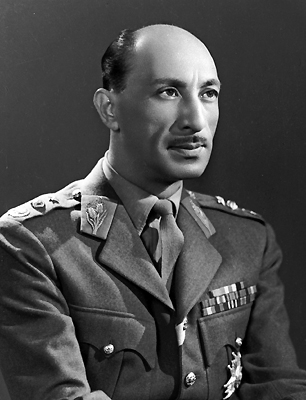
Mohammad Zahir Shah was the last King of Afghanistan, reigning from 8 November 1933 until he was deposed on 17 July 1973. Serving for 40 years, Zahir was the longest-serving ruler of Afghanistan since the foundation of the Durrani Empire in the 18th century.

The government of Afghanistan is currently disputed following the effective collapse of the Islamic Republic of Afghanistan during the fall of Kabul to Taliban forces on 15 August 2021 and the subsequent re-establishment of the Islamic Emirate of Afghanistan which now exercises de facto control over most of the country. On 7 September 2021 the Taliban officials in de facto control of most of Afghanistan announced a new interim government headed by Mullah Mohammad Hassan Akhund as Prime Minister. The government is subject to the oversight of the Taliban's Supreme Leader, Haibatullah Akhundzada. As of 8 September 2021, the Islamic Emirate of Afghanistan has not yet been formally recognized as the de jure government of Afghanistan by any other country. The representatives appointed by the Islamic Republic of Afghanistan continue to represent the country at the United Nations. These representatives have refused to recognize the Taliban appointed government and have urged other countries to not recognize this government either.

Hamid Karzai is an Afghan politician who served as the fourth president of Afghanistan from July 2002 to September 2014, including as the first elected president of the Islamic Republic of Afghanistan from December 2004 to September 2014. He previously served as Chairman of the Afghan Interim Administration from December 2001 to July 2002. He is the chief (khān) of the Popalzai Durrani tribe of Pashtuns in Kandahar Province.

Mohammad Ashraf Ghani Ahmadzai is an Afghan former politician, academic, and economist who served as the president of Afghanistan from September 2014 until August 2021, when his government was overthrown by the Taliban.
Though Afghanistan has had democratic elections throughout the 20th century, the electoral institutions have varied as changes in the political regime have disrupted political continuity. Elections were last held under the Islamic Republic of Afghanistan, which was deposed by the Taliban in August 2021. The Taliban dissolved the Elections Commission in December 2021. In May 2022, when asked if the Taliban would hold elections, First Deputy Leader Sirajuddin Haqqani said the question was "premature". All political parties have been banned since August 2023.
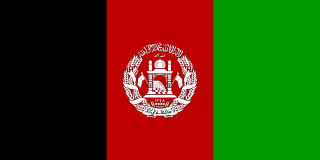
The Transitional Islamic State of Afghanistan (TISA), also known as the Afghan Transitional Authority, was the name of the temporary transitional government in Afghanistan put in place by the June 2002 loya jirga. The Transitional Authority succeeded the original Islamic State of Afghanistan, and preceded the Islamic Republic of Afghanistan (2004–2021).

Ahmad Zia Massoud is an Afghan politician who was the vice president of Afghanistan in the first elected administration of President Hamid Karzai, from December 2004 to November 2009. He is a younger brother of the late Ahmad Shah Massoud, the resistance leader against the Soviet invasion of Afghanistan and against the Taliban. In late 2011, Ahmad Zia Massoud joined hands with major leaders in the National Front of Afghanistan, which strongly opposed a return of the Taliban to power. The National Front was generally regarded as a reformation of the United Front which with U.S. air support temporarily removed the Taliban from power in late 2001.
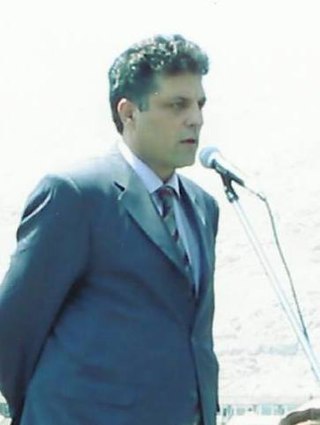
Abdul Latīf Pedrām is a politician and a Member of Parliament in Afghanistan. He emerged as a controversial figure in the press and political circles for campaigning for women's personal rights, a taboo subject in Afghanistan's culture. Currently, he is the leader of the National Congress Party of Afghanistan and was one of the nine representatives of Badakhshan province in the lower house of parliament. He has since been living in exile. His hometown fell prior to Kabul.
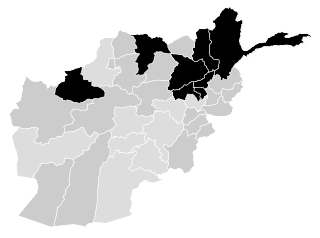
Presidential elections were held in Afghanistan on 20 August 2009. The election resulted in victory for incumbent Hamid Karzai, who received 49.67% of the vote, while his main rival Abdullah Abdullah finished second with 30.59% of the vote.

Abdullah Abdullah is an Afghan politician who led the High Council for National Reconciliation (HCNR) from May 2020 until August 2021, when the Afghan government was overthrown by the Taliban. The council had been established to facilitate peace talks between the Islamic Republic of Afghanistan and the Taliban insurgents. Abdullah served as the Chief Executive of Afghanistan from September 2014 to March 2020, and as Minister of Foreign Affairs from December 2001 to April 2005. Prior to that, he was a senior member of the Northern Alliance, working as an adviser to Ahmad Shah Massoud. He worked as an ophthalmologist and medical doctor in the 1980s.
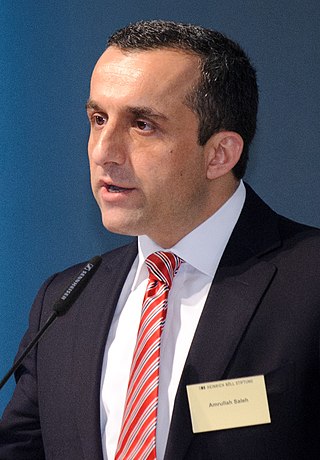
Amrullah Saleh is an Afghan politician who served as the first vice president of Afghanistan from February 2020 to August 2021, and acting interior minister from 2018 to 2019. He was the head of the National Directorate of Security (NDS) from 2004 to 2010.

The Afghan conflict refers to the series of events that have kept Afghanistan in a near-continuous state of armed conflict since the 1970s. Early instability followed the collapse of the Kingdom of Afghanistan in the largely non-violent 1973 coup d'état, which deposed Afghan monarch Mohammad Zahir Shah in absentia, ending his 40-year-long reign. With the concurrent establishment of the Republic of Afghanistan, headed by Mohammad Daoud Khan, the country's relatively peaceful and stable period in modern history came to an end. However, all-out fighting did not erupt until after 1978, when the Saur Revolution violently overthrew Khan's government and established the Democratic Republic of Afghanistan. Subsequent unrest over the radical reforms that were being pushed by the then-ruling People's Democratic Party of Afghanistan (PDPA) led to unprecedented violence, prompting a large-scale pro-PDPA military intervention by the Soviet Union in 1979. In the ensuing Soviet–Afghan War, the anti-Soviet Afghan mujahideen received extensive support from Pakistan, the United States, and Saudi Arabia in a joint covert effort that was dubbed Operation Cyclone.

The Republic of Afghanistan was the first republic in Afghanistan. It is often called the Daoud Republic, as it was established in July 1973 after General Sardar Mohammad Daoud Khan deposed his cousin, King Mohammad Zahir Shah, in a coup d'état. General Daoud was known for his autocracy and attempts to modernize the country with help from both the Soviet Union and the United States, among others.

The National Coalition of Afghanistan, was a political coalition in Afghanistan led by Abdullah Abdullah, Afghanistan's former foreign minister (2001–2005) and main challenger of President Hamid Karzai in the 2009 Afghan presidential elections. Abdullah Abdullah was a close friend of the Northern Alliance leader Ahmad Shah Massoud who was assassinated two days before the September 11 attacks.

Presidential elections were held in Afghanistan on 5 April 2014, with a second round held on 14 June. Incumbent President Hamid Karzai was not eligible to run due to term limits. The registration period for presidential nominations was open from 16 September 2013 until 6 October 2013. A total of 27 candidates were confirmed to be running for office. However, on 22 October Afghanistan's Independent Election Commission disqualified 16 of the candidates, leaving only 11 in the race. By April 2014 three candidates gave up the race and decided to support some of the eight remaining candidates. Opinion polls showed Abdullah Abdullah and Ashraf Ghani as the front-runners and indeed the results of the first round of the election had Abdullah in the lead and Ghani behind him. The second set of results came after the run-off on 14 June, two months after the first round. Preliminary results were expected on 2 July and the final result on 22 July. However, widespread accusations of fraud delayed these results. As a result, John Kerry, then United States Secretary of State, mediated the negotiations between the two final candidates, Ghani and Abdullah. After a series of negotiations and talks between Ghani, Abdullah and Kerry, the two candidates agreed to sign an Agreement to form a National Unity Government based on 50–50 power sharing. As a result of that political agreement, a separate position was created for Abdullah as Chief Executive. The National Unity Government's term ran out after the next Afghan presidential election was held in September 2019.

The 1973 Afghan coup d'état, also called by Afghans as the Coup of 26 Saratan and self-proclaimed as the Revolution of 26 Saratan 1352, was led by Army General and prince Mohammad Daoud Khan against his cousin, King Mohammad Zahir Shah, on 17 July 1973, which resulted in the establishment of the Republic of Afghanistan under a one-party system led by Daoud Khan.

Afghanistan–France relations are the diplomatic relations between Afghanistan and France. Both nations are members of the United Nations.

The Islamic Republic of Afghanistan was a presidential republic that ruled Afghanistan from 2004 to 2021. The state was established to replace the Afghan interim (2001–2002) and transitional (2002–2004) administrations, which were formed after the 2001 United States invasion of Afghanistan that had toppled the partially recognized Taliban-ruled Islamic Emirate of Afghanistan. However, on 15 August 2021, the country was recaptured by the Taliban, which marked the end of the 2001–2021 war, the longest war in US history. This led to the overthrow of the Islamic Republic, led by President Ashraf Ghani, and the reinstatement of the Islamic Emirate under the control of the Taliban. While the United Nations still recognizes the Islamic Republic as the legitimate government of Afghanistan, this toppled regime controls no portion of the country today, nor does it operate in exile; it effectively no longer exists. The Islamic Emirate is the de facto ruling government. The US–Taliban deal, signed on 29 February 2020 in Qatar, was one of the critical events that caused the collapse of the Afghan National Security Forces (ANSF). Following the deal, the US dramatically reduced the number of air attacks and deprived the ANSF of a critical edge in fighting the Taliban insurgency, leading to the Taliban takeover of Kabul.
The politics of Afghanistan are based on a totalitarian emirate within the Islamic theocracy in which the Taliban Movement holds a monopoly on power. Dissent is not permitted, and politics are mostly limited to internal Taliban policy debates and power struggles. As the government is provisional, there is no constitution or other basis for the rule of law. The structure is autocratic, with all power concentrated in the hands of the supreme leader and his clerical advisors. According to the V-Dem Democracy indices Afghanistan was 2023 the 4th least electoral democratic country in the world.
















